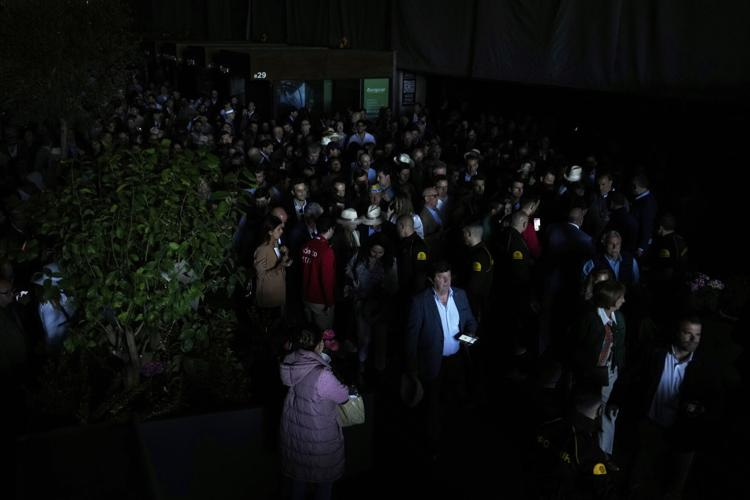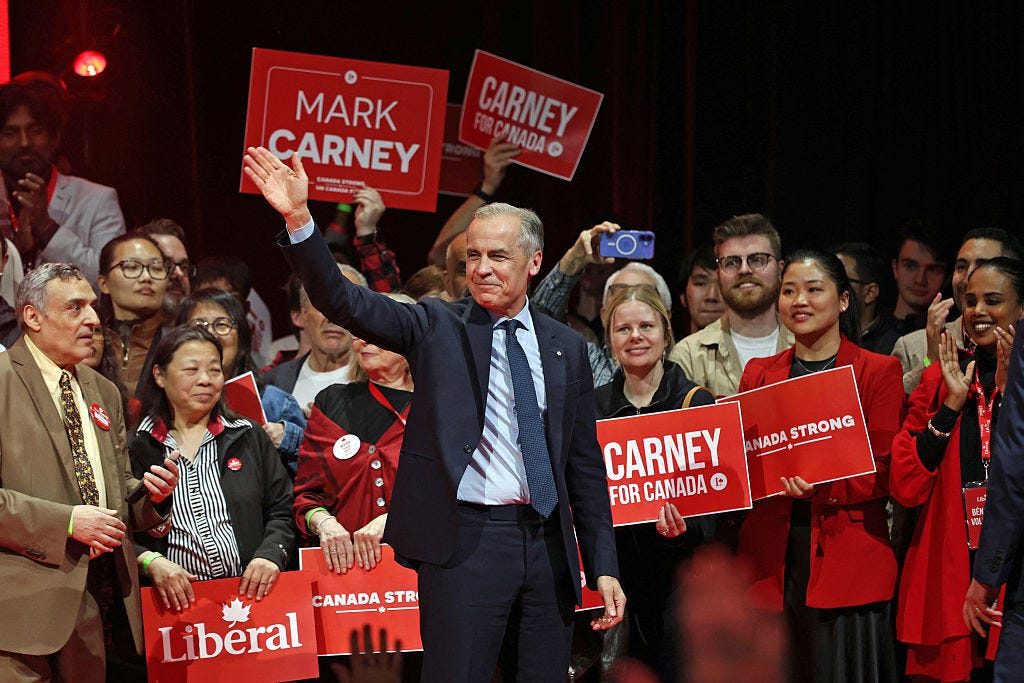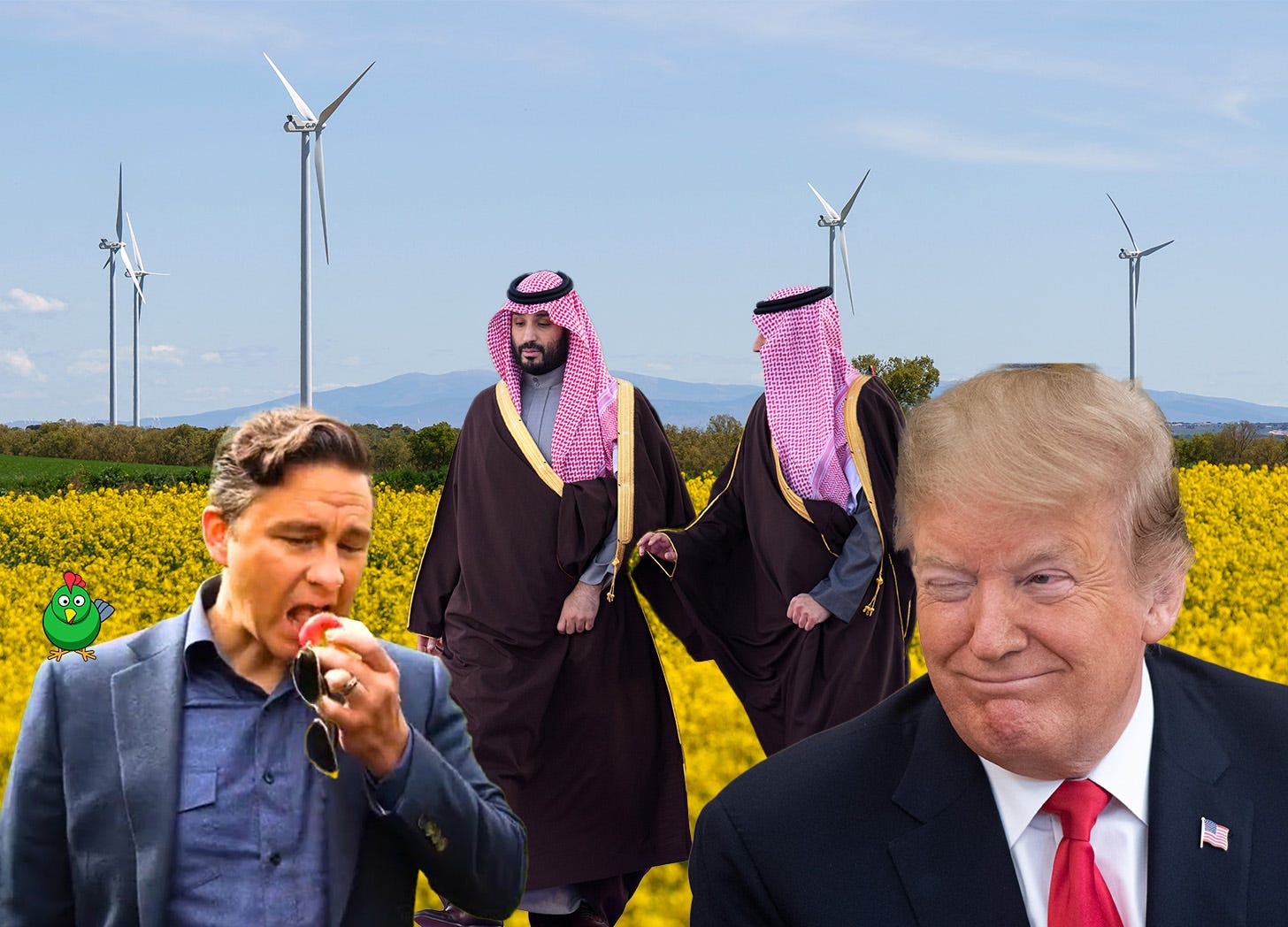The Week That Was
A trifecta of historic developments that will have come as no surprise to Doomberg readers.
“Reality is nothing but a collective hunch.”—Lily Tomlin
One of the challenges of writing on a multi-day editorial cycle is managing headline risk, a phenomenon that presents itself in two forms. In the first, an event occurs that meaningfully reshapes the underlying subject matter, triggering the need for a rewrite—a common occurrence during the first 100 days of President Donald Trump’s return to the Oval Office. The second variant arises when multiple stories unfold concurrently, making it difficult to decide which one is most deserving of timely commentary.
Events of the past week fall into the latter category, with dramatic developments breaking across three important narrative arcs previously covered in these pages: the widespread grid collapse in Spain, the federal elections in Canada, and continued bearish commentary from Saudi Arabia on the future of oil prices. In a break from our regular format, we address all three situations in this single missive.
Spanish Flu
In January of 2024, we published “Inverted Priorities,” an essay that warned of an underappreciated risk posed by forcing intermittent renewable energy sources onto pre-existing grids. We began that piece by noting that modern electricity grids are classic non-linear systems susceptible to difficult-to-model interdependencies that can lead to unexpected challenges for operators. Traditional forms of generation—like coal, natural gas, and nuclear—provide an embedded buffer against grid chaos: Large spinning turbines endow electricity grids with the inertia to ride out minor fluctuations in frequency, reducing the risk of butterflies causing hurricanes. Solar and wind offer no such insurance, relying instead on inverters to deliver product to market.
We were hardly alone in flagging this hazard—experts have been issuing similar warnings with varying urgency for years. There are ways to offset such risks, of course, but doing so requires significant upfront investments that make already-expensive forms of electricity even more so, further straining the false narrative that renewables are cheap. We closed our article as follows:
“In an ideal world, enhanced fault ride-through requirements would have been imposed on renewable energy projects before they were allowed to reach critical mass on our grids, but the mad dash for public cash appears to have resulted in systemic corner-cutting. Redundancy investments do not come cheap, and we suspect the costs consumers will ultimately have to bear to abate this foreseeable risk will be substantial.
But then again, imagine the alternative.”
The response to the grid collapse in Spain has been interesting to observe: defenders of renewables first tried to obscure the likely root cause, then pivoted to accusing those who stated the obvious of jumping the gun. With neither effort proving particularly effective, a new narrative-management strategy is now being tested. In an unironic Reuters commentary titled “Don’t blame renewables for Spain’s power outage,” we find this priceless gem:
“While it may be tempting to blame the unprecedented power outage that hit the Iberian peninsula this week on the rapid growth of wind and solar power in Spain, reliance on renewables is not to blame. Rather, the issue appears to be the management of renewables in the modern grid.
The massive blackout on Monday – the biggest in Europe's history – should be a stark warning to governments: investments in power storage and grid upgrades must go hand in hand with the expansion of renewables generation.”
Now they tell us.
Oh, Canada
We find it endlessly fascinating that most Canadians believe they live in a representative democracy, where aspiring candidates engage in authentic politicking to earn their place in office. So accustomed are Canada’s power brokers to getting their way, they rarely bother to cover their tracks. A careful reading of the notoriously pliant Canadian press makes anticipating future events in the country surprisingly straightforward.
Back in December, when Pierre Poilievre was given better than 90% odds of replacing Prime Minister Justin Trudeau—and Mark Carney was still just an uncharismatic banker few had heard of—we engaged in some not-so-speculative dot-connecting and correctly predicted Carney’s rise to the top spot. Our interest was driven by the notoriously rocky relationship between Ottawa and the Province of Alberta, home to one of the world’s largest hydrocarbon reserves, and how Carney’s rise might be a catalyst for resetting Canada’s energy trajectory. In a follow-up article titled “The Fix Is In,” we laid out a few more predictions:
“Here’s how the play is likely to unfold in the weeks and months ahead: Carney will be elected Prime Minister on April 28 by a comfortable margin; [Alberta Premier Danielle] Smith will trigger a constitutional crisis, providing cover for Carney to strike a grand bargain that finally resolves longstanding tensions between the provinces and Ottawa; and large infrastructure permitting reform will fall into place. Protests against these developments will be surprisingly muted, and those who do take to the streets will be largely ignored by the media. The entire effort will be wrapped in a thicket of patriotism, with Trump portrayed as a threat even greater than climate change itself. References to carbon emissions will slowly fade…
In parallel, we expect Trump and Carney to swiftly strike a favorable deal on tariffs, padding the latter’s bona fides just as his political capital will be most needed.”
The votes have barely been counted, yet the next moves are already unfolding…
“Alberta Premier Danielle Smith says she’ll make it easier for citizens to initiate a referendum on the province’s future in Canada, after warning that a Liberal win in Monday’s election could spur a groundswell of support for Alberta separatism. Smith said on Tuesday that a newly tabled elections bill will give everyday Albertans a bigger say in the province’s affairs.
‘(We’re giving) Albertans more ways to be directly involved in democracy, and to have their say on issues that matter to them,’ Smith told reporters in Edmonton.
If passed, the new law would dramatically lower the number of signatures needed to put a citizen-proposed constitutional referendum question on the ballot, setting a new threshold of 10 per cent of general election turnout — or just over 175,000, based on Alberta’s last provincial election in 2023.”
“US President Donald Trump said on Wednesday that Canadian Prime Minister Mark Carney is looking to make a trade deal and will visit the White House within the next week. Trump said he congratulated Carney on his election victory when the Canadian leader called on Tuesday.
‘He called me up yesterday - he said let's make a deal,’ Trump told reporters at the White House after a televised Cabinet meeting.”
Remember where you read it first.
Saudi Surrender
President Trump has made no secret of his intent to flood the market with cheap energy to drive down the price of oil. He ran on a platform of American energy dominance, routinely boasts about affordable US gasoline on social media, and shows a keen understanding of the role abundant energy plays in catalyzing his envisioned manufacturing renaissance. The real mystery is why so many energy investors remain hesitant to believe him—or continue to underestimate his influence on markets.
Such reticence was the motivation behind “Punctuated Equilibrium,” which captured our initial response to the unexpected announcement that Saudi Arabia would play ball with Trump—a development that sent oil prices tumbling to multi-year lows. Here’s a key excerpt:
“The timing of OPEC’s surrender hints at its likely irreversibility. The US, Russia, and Saudi Arabia—the three largest hydrocarbon producers in the world—have been engaged in high-stakes diplomacy since the outset of Trump’s return to office. The headline justification for this flurry of activity has been the war in Ukraine, but history teaches that punctuating decisions like these are often cloaked in misdirection. Trump wants $50 oil and he looks likely to get it. What has been given in return is not yet known, but OPEC’s decision to pour oil on Thursday’s burning tape hardly feels like a coincidence.”
Although the Saudi pivot did push prices down, West Texas Intermediate crude ultimately stabilized in a range between $60 and $65 per barrel, far too high for Trump’s liking. The beatings, therefore, continued on Wednesday:
“Saudi Arabian officials are briefing allies and industry experts to say the kingdom is unwilling to prop up the oil market with further supply cuts and can handle a prolonged period of low prices, five sources with knowledge of the talks said.
This possible shift in Saudi policy could suggest a move toward producing more and expanding its market share, a major change after five years spent balancing the market through deep output as a leader of the OPEC+ group of oil producers.”
A common theme across these three narratives is the legacy media’s failure to accurately inform readers about the underlying realities of each. Intermittent renewables make grids more expensive and less reliable—an axiom that remains true no matter how many blatantly misleading articles claim otherwise. No true conservative maverick is going to steamroll Canada’s power brokers the way Trump did in America—heck, Poilievre wasn’t even allowed to keep his seat in Parliament, losing instead to a man allegedly named Bruce Fanjoy. Finally, the world is awash in cheap hydrocarbons, the oil market has always been heavily managed, and the opinion of the sitting US president remains a critical input into Saudi Arabia’s decision-making, even when that president is Orangemanbad.
In the long run, the real headline risk is accruing within traditional newsrooms. With each obvious attempt at spin, credibility erodes—and the opening widens for alternative sources of news and opinion.
For that, we suppose, we should be grateful.
“♡” this piece for more fact-based forecasting!









The Five I's of Renewable Failure
Intermittency
Inversion
Inertia
Interdependencies
Investment
And maybe a 6th? Idiocy
That was a fantastic essay and, so far, you've nailed the Canadian election.
Perhaps my favorite section was the hammering renewables lackies came in for. It was short but particularly brutal. The Texas ice storm of 2021 was also a renewables failure but they were somewhat effective in obscuring responsibility. Not this time. They are caught outside in a hailstorm and there's not a tree or shed to be found.